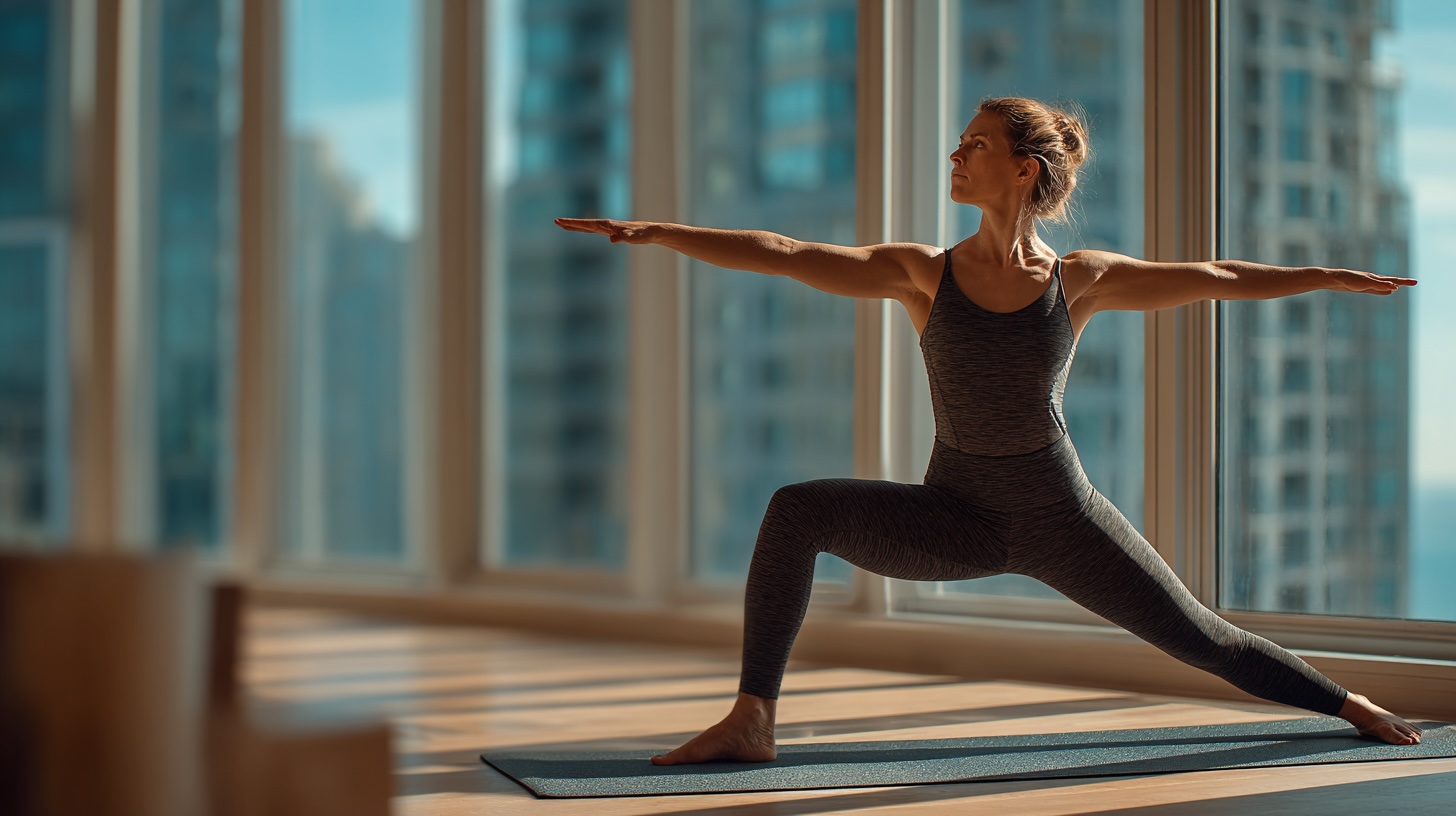In today’s fast-paced world, mindfulness meditation has emerged as a powerful practice for finding peace and balance in everyday life. This ancient technique, now backed by modern science, helps you cultivate awareness of the present moment without judgment.
Think of mindfulness meditation as a mental workout – just as physical exercise strengthens your body, regular meditation strengthens your mind. You’ll learn to:
- Reduce stress and anxiety
- Enhance emotional well-being
- Improve focus and concentration
- Develop greater self-awareness
The beauty of mindfulness lies in its simplicity and accessibility. You don’t need special equipment or hours of free time – even 5-10 minutes daily can create meaningful change in your life.
This beginner’s guide will walk you through practical techniques to integrate mindfulness into your daily routine. Whether you’re dealing with work stress, relationship challenges, or simply seeking greater peace of mind, you’ll discover tools to help you navigate life’s ups and downs with greater ease and clarity.
For instance, if you’re experiencing menopause, the stress from this transition can be alleviated through mindfulness practices coupled with specific dietary changes that promote overall health.
Similarly, if you’re on medication like Ozempic and still feeling full hours after lunch, understanding how it affects fullness can help you manage side effects better while practicing mindfulness.
If you’re considering switching medications from Jardiance to Ozempic, it’s crucial to explore key considerations regarding their effectiveness and benefits before making any decisions.
Mindfulness can also play a significant role in managing anxiety. For those exploring options like ketamine for anxiety relief, understanding how fast it works can provide valuable insights into its effects and patient experiences.
Finally, mindfulness isn’t just about mental well-being; it can also enhance your approach towards skincare routines. By incorporating mindful practices, you can better understand your skin’s needs and adjust your routine accordingly based on the latest breakthroughs in skincare technology.
Understanding the Essence of Mindfulness Meditation
Present moment awareness is at the heart of mindfulness meditation. It involves being fully engaged with the here and now, noticing your thoughts, feelings, and sensations without attaching any judgments to them. This practice encourages a state of non-judgmental observation, where you simply witness experiences as they unfold.
Cultivating Curiosity Towards Your Inner Landscape
Cultivating curiosity towards your inner landscape can transform how you relate to your thoughts and emotions. By approaching each meditation session with a sense of openness, you allow yourself the freedom to explore whatever arises without resistance. This means accepting both pleasant and unpleasant experiences with equal kindness.
Building a Foundation for Greater Self-Awareness
Incorporating these elements into your practice builds a foundation for greater self-awareness. You develop the ability to recognize habitual patterns in your thinking and behavior, which can lead to more intentional and mindful living. Adopting this mindset during meditation sessions helps you carry these qualities into your daily life, fostering a balanced and resilient approach to challenges.
Mindfulness Beyond Mental Health
However, it’s important to remember that mindfulness isn’t just about mental health; it can also play a significant role in managing physical health conditions. For instance, individuals dealing with chronic conditions such as diabetes may find that incorporating mindfulness practices into their routine can help alleviate some stress associated with their condition. In fact, healthy snacks for diabetes can be more easily chosen when one is in a mindful state.
Moreover, mindfulness can complement medical treatments like Sublingual Semaglutide, a new non-invasive diabetes treatment option that enhances patient compliance and promotes weight loss effectively.
Additionally, regular exercise, often encouraged during mindfulness sessions, has proven benefits for mental health as well.
The Importance of Understanding Influencing Factors
Lastly, understanding how various factors such as gut health or hormonal levels can influence overall well-being is crucial. For example, research has shown that gut microbes can cause issues like constipation. On the other hand, Testosterone Replacement Therapy (TRT) can have significant impacts on men’s health. By integrating mindfulness into our lives, we not only enhance our mental well-being but also pave the way for better management of these physical health aspects.
Basic Techniques for Beginners
Breath-focused meditation is one of the most accessible beginner practices. Start by sitting comfortably, either on a chair or cushion, with your back straight but relaxed. Close your eyes if it feels comfortable. Gently bring awareness to your breath, noticing the sensation of air entering and leaving your nostrils or the rise and fall of your chest. This simple act serves as an anchor, helping to develop concentration and stability during practice.
Using sensory anchors can also be effective for maintaining presence. Pay attention to sounds around you—perhaps the hum of a fan or birds chirping outside. Notice the sensations in your body, such as the feeling of your feet touching the floor or your hands resting in your lap. These sensory experiences help ground you in the present moment.
During meditation, it’s natural for the mind to wander. When this happens, gently guide your attention back to your chosen anchor, whether it’s the breath or a sensory experience. This process of noticing distractions without judgment and returning focus strengthens mindfulness over time.
Engaging with these basic techniques regularly helps build a foundation for more advanced practices, enhancing overall well-being and emotional resilience. It is important to remember that these practices can also be beneficial in managing stress effectively through holistic techniques such as mindfulness and breath control.
Furthermore, maintaining a positive mindset during these practices can have long-lasting effects on our health, including protecting children’s heart health when instilled from a young age. Lastly, while these techniques are primarily aimed at mental well-being, they can also aid in addressing physical health issues such as constipation caused by gut microbes, by promoting overall wellness and emotional resilience.
Common Mindfulness Practices for Everyday Life
Here are three essential mindfulness practices you can weave into your daily routine:
1. Breathing Meditation (5-10 minutes)
Find a quiet spot during your morning routine
- Place one hand on your chest, another on your belly
- Notice the natural rhythm of your breath
- Count each inhale and exhale from 1 to 10
- Return to 1 when you reach 10 or lose count
This breathing meditation can be especially helpful if you’re feeling anxious about certain health issues, such as the potential Ozempic and bowel injury, which might be causing you stress.
2. Body Scan Meditation (10-15 minutes)
Lie down in a comfortable position
- Direct your attention to your toes
- Move your awareness slowly up through your body
- Notice any sensations, tension, or comfort
- Release any held tension as you scan upward
- End the scan at the crown of your head
This meditation can also serve as a great way to improve sleep and relaxation, which is often disrupted by stress or anxiety.
3. Compassion Meditation (10 minutes)
Sit in a relaxed position
- Think of someone you care about deeply
- Silently repeat these phrases:
- “May you be happy”
- “May you be healthy”
- “May you be safe”
- “May you live with ease”
- Direct these wishes to yourself
- Extend them to others in your life
You can practice these meditations during:
- Your morning coffee ritual
- Lunch breaks at work
- Evening wind-down routine
- Waiting in line or traffic
- Before important meetings
- After challenging conversations
These mindfulness practices build upon each other. The breathing meditation grounds you in the present moment, the body scan deepens your awareness, and compassion meditation nurtures emotional well-being.
Benefits of Regular Mindfulness Practice
Consistent mindfulness meditation offers measurable benefits that extend beyond the meditation cushion. Decades of scientific research now confirm what practitioners have observed for centuries: mindfulness is a powerful tool for stress reduction, emotional regulation, and improved focus.
Stress Reduction
Mindfulness practice helps downregulate the body’s stress response. Studies show regular meditators experience lower levels of cortisol, the hormone associated with chronic stress. Brain imaging research reveals that mindfulness can decrease activity in the amygdala—the brain’s “alarm system”—leading to a calmer baseline state. People who practice mindfulness report fewer episodes of being overwhelmed and an increased capacity to handle daily pressures.
For those struggling with weight management due to stress-related eating, understanding options like Phentermine vs. Ozempic could be beneficial. These medications offer different approaches to effective weight management, providing valuable insights for informed decisions.
Emotional Regulation
Mindfulness enhances your ability to notice thoughts and feelings as they arise, without automatically reacting. Clinical trials have found that those who meditate consistently score higher on measures of emotional resilience and self-compassion. This translates to greater stability during difficult moments, reduced impulsivity, and a more balanced response to both pleasant and unpleasant emotions. For individuals struggling with anxiety or mood swings, these changes can be life-changing.
In some cases, these emotional challenges might lead individuals to consider drastic measures such as extreme dieting or fasting. However, it’s crucial to approach such strategies with caution. For instance, if one is considering a 96-hour fast for weight loss, understanding its benefits and risks is essential for safe practice.
Improved Focus and Attention Span
Regular mindfulness practice trains the mind to return to a chosen anchor—like the breath or bodily sensations—whenever distractions appear. Neuroscientific studies demonstrate improvements in sustained attention and working memory after just a few weeks of daily meditation. This heightened focus spills over into everyday tasks:
- Increased productivity at work
- Fewer mistakes due to mind-wandering
- Enhanced listening skills in conversations
Mindfulness also fosters metacognitive awareness—the ability to observe thoughts from a distance—helping you regain control when attention drifts.
As these benefits accumulate, many find themselves experiencing greater clarity, ease, and joy throughout daily life. The clinical applications of mindfulness expand on these foundational benefits, offering targeted support for specific health conditions.
For individuals managing chronic conditions like Type 2 diabetes, exploring medication options such as Jardiance and Ozempic may provide additional support in conjunction with lifestyle changes encouraged by mindfulness practices.
Moreover, it’s important to recognize that women’s health issues may also benefit from the holistic approach offered by mindfulness. By embracing this practice alongside expert advice found in resources like WellnessHQ’s Women’s Health Archives, individuals can empower themselves with insights and tips for total wellness.
Clinical Applications of Mindfulness Meditation
Mindfulness meditation has found significant applications in clinical settings, particularly through programs like Mindfulness-Based Stress Reduction (MBSR) and Mindfulness-Based Cognitive Therapy (MBCT).
Mindfulness-Based Stress Reduction (MBSR)
- Developed by Dr. Jon Kabat-Zinn, MBSR is an eight-week program designed to help individuals manage stress, anxiety disorders, and chronic pain.
- The program combines mindfulness meditation with body awareness techniques to enhance the participant’s ability to cope with stressors.
- Research indicates that MBSR can lead to significant reductions in symptoms of anxiety and depression, as well as improvements in quality of life for those with chronic conditions.
Mindfulness-Based Cognitive Therapy (MBCT)
- MBCT integrates mindfulness practices with cognitive-behavioral strategies. It aims to prevent the relapse of depression in individuals who have experienced recurrent depressive episodes.
- This approach encourages participants to develop a mindful awareness of their thoughts and feelings, helping them break the cycle of habitual negative thinking patterns.
- Clinical trials demonstrate that MBCT can substantially reduce the risk of depression relapse, making it a valuable tool in mental health treatment.
Both MBSR and MBCT highlight how mindfulness meditation can be tailored to address specific mental health challenges, offering structured approaches that blend traditional meditative practices with therapeutic techniques.
In addition to these benefits, it’s important to note that holistic wellness also involves other aspects such as proper hydration which plays a vital role in overall health from cognitive performance to weight management. Furthermore, exploring new health trends like intermittent fasting can provide additional benefits for metabolic health.
Integrating Mindfulness into Daily Routines
Mindfulness can seamlessly become part of your daily activities, enhancing your overall well-being. Here are some practical tips:
1. Mindful Eating
Pay close attention to the taste, texture, and aroma of your food. Chew slowly, savor each bite, and notice the sensations in your body as you eat. This practice can transform meals into a more enjoyable and fulfilling experience. For instance, understanding how to build a balanced diet can further enhance your mindful eating journey.
2. Mindful Walking
While walking, focus on the sensation of your feet touching the ground. Notice the rhythm of your steps and the movement of your body. Pay attention to the sights, sounds, and smells around you. This can turn an ordinary walk into an opportunity for tranquility and presence.
3. Mindful Listening
When engaging in conversations, give your full attention to the speaker. Listen without interrupting or planning what to say next. Notice their words, tone, and body language. This practice fosters deeper connections and enhances communication skills.
By incorporating these simple practices into your routine, you cultivate mindfulness throughout the day. This approach not only helps manage stress but also encourages a greater appreciation for everyday moments.
Overcoming Common Challenges for Beginners in Mindfulness Practice
Distractions in meditation are a common hurdle. When your mind wanders, acknowledge the distraction without judgment and gently redirect your focus back to your breath or chosen anchor. This gentle redirection is a core part of the practice, not a failure. It helps in developing concentration and awareness.
Strategies for Dealing with Wandering Thoughts
- Labeling Thoughts: Mentally note what type of thoughts you are having (e.g., planning, worrying) and then return to your focus.
- Focus on Sensations: Pay attention to the physical sensations of breathing or other sensory experiences. This can ground you in the present moment.
- Short Sessions: Start with shorter meditation sessions, gradually increasing the duration as your concentration improves.
Patience in Practice
Cultivating patience is essential. Progress may be slow and non-linear, but each session contributes to your growth in mindfulness.
Managing Expectations
Having realistic expectations is crucial. Mindfulness is not about achieving a perfect state of calm but building awareness and acceptance. Celebrate small milestones like noticing fewer distractions over time.
Importance of Self-Compassion
Be kind to yourself during this journey. Criticizing yourself for a wandering mind or inconsistent practice can hinder progress. Instead, offer yourself the same compassion you would extend to a friend facing similar challenges.
By addressing these common issues with strategies and kindness, you build a sustainable mindfulness practice that enriches everyday life.
Exploring Resources for Deepening Your Mindfulness Journey
Your mindfulness practice can flourish with the right digital tools and resources. Here’s a curated selection of trusted platforms to support your meditation journey:
Popular Mindfulness Apps
- Headspace: Perfect for beginners with its structured courses and playful animations
- Calm: Known for sleep stories and nature sounds alongside guided meditations
- Insight Timer: Offers a vast library of free meditations from various teachers
- Ten Percent Happier: Features science-based approaches and expert interviews
Online Learning Platforms
- Coursera: Access mindfulness courses from leading universities
- FutureLearn: Structured programs taught by meditation experts
- Mindful.org: Free articles, videos, and guided practices
YouTube Channels
- Tara Brach
- Jon Kabat-Zinn
- Mindful Movement
- Plum Village
Meditation Timer Apps
- Zen Timer: Simple interface for unguided practice
- Mindfulness Bell: Gentle interval bells for awareness during daily activities
These resources offer different teaching styles and approaches. You might try several to discover what resonates with your learning style. Many platforms provide free trials or basic versions to help you explore before committing to a paid subscription.
Conclusion
Starting your mindfulness meditation practice is the first step towards improving your mental fitness and finding emotional balance. With each breath and moment of awareness, you’re laying the groundwork for a more peaceful and centered life.
By starting with just 5 minutes a day, you’ll begin to see positive changes in your life. As you continue to practice, you can expect:
- Better decision-making skills
- Stronger connections with others
- A sense of calm during difficult times
- Increased happiness in everyday moments
The beauty of mindfulness is that it’s simple and accessible. You don’t need any special tools or extensive training—just the desire to be present and fully engaged in each moment.
It’s important to remember that mindfulness isn’t about being perfect. It’s about consistently bringing your attention back to the present moment with kindness and acceptance. By embracing this practice, you’re prioritizing your well-being and developing a valuable skill that will benefit you throughout your life.
So why wait? Start your journey towards mindful living today. Your future self will be grateful for the choice you made to live with intention and awareness.
FAQs (Frequently Asked Questions)
What is mindfulness meditation and why is it gaining popularity?
Mindfulness meditation is the practice of being fully present and aware of the current moment without judgment. It has gained popularity as an effective tool for enhancing well-being and managing stress in everyday life.
How can beginners start practicing mindfulness meditation?
Beginners can start by sitting comfortably and focusing on their breath as an anchor to develop concentration. Using sensory experiences like sounds or body sensations also helps maintain presence during meditation sessions.
What are some common mindfulness practices suitable for daily routines?
Common mindfulness practices include breathing meditation, body scan meditation, and compassion meditation. These techniques can be easily integrated into everyday life to cultivate awareness and emotional balance.
What are the key benefits of regular mindfulness practice?
Regular mindfulness practice has been shown to reduce stress, improve emotional regulation, enhance focus, and increase overall mental health resilience based on scientific evidence.
How is mindfulness used clinically for mental health treatment?
Mindfulness-Based Stress Reduction (MBSR) helps manage conditions like anxiety disorders and chronic pain, while Mindfulness-Based Cognitive Therapy (MBCT) is effective in preventing depression relapse through structured mindfulness interventions.
What strategies help overcome common challenges faced by beginners in mindfulness meditation?
To manage distractions and wandering thoughts, beginners should practice patience and self-compassion. Setting realistic expectations and consistently engaging in guided sessions can support developing a steady mindfulness routine.






